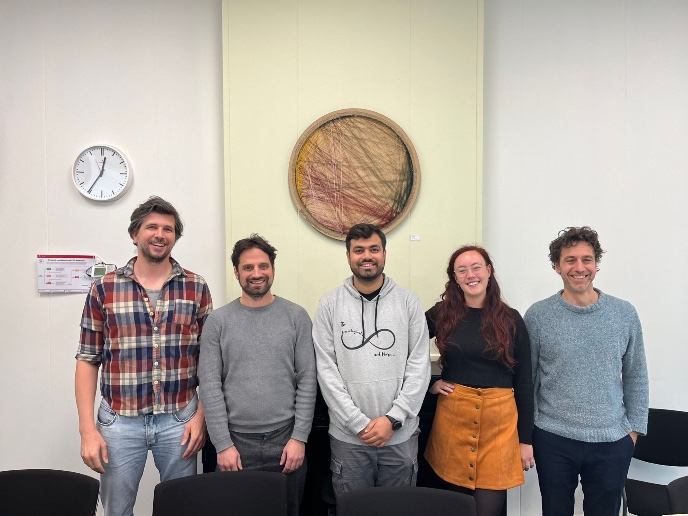UCG research group: The Groningen Philosophy of Physics Group
Workshops
Join us on 25-26 August for the workshop 'The coherence of retrocausality' and on 12 September for the workshop 'History and Philosophy of Physics.'
The coherence of retrocausality
Workshop : The coherence of retrocausality
25 and 26 August 2025, University College Groningen, Hoendiepskade 23/24
Retrocausality presents a rich field for inquiry, offering both conceptual challenges and opportunities. Among its notable challenges are the classic consistency issues, such as the grandfather paradox, and the bilking argument by Max Black, which question its overall viability. Despite these obstacles, retrocausality remains a promising avenue for research -- particularly in quantum mechanics. Hypothesizing backward-in-time probabilistic dependencies may pave the way toward a convincing single-world realist interpretation of quantum phenomena. In this vein, the exploration of the "retrocausality loophole" to Bell's theorem is part of the motivation for this workshop.
Programme
Monday
10.00 Welcome and cultural activity option
13.00 Alison Fernandes, The Physical Basis of Backwards Causation
14.00 Jan Faye, Do we have an understanding of backward causation?
15.30 Mathias Frisch, TBA
16.30 Jenann Ismael, Who’s afraid of retrocausality?
17.30 Sean Gryb, A new scenario for the arrow of time
19.30 Workshop dinner
Tuesday
9.30 Emily Adlam, Counterfactuals and explanation in all-at-once models
10.30 Simon Friederich, Going beyond forward-in-time nomic probabilities to make Einstein’s vision for the future of quantum theory come true.
12.00 Jørn Kløvfjell Mjelva, Markovianity and Statistical Independence in Entanglement Swapping Experiments
14.00 Joppe Widstam, Inference and Fine-Tuning in Causal Explanations of Bell-Inequality Violations
15.00 Pete Evans, Faithfully Silent: Tuning out the signal
16.30Guido Baccialuppi, Locality, retrocausality, and signalling
History and Philosophy of Physics
History and Philosophy of Physics (HPP) - NL workshop
The next HPP-NL workshop will take place in Groningen on 12 September, from 13:00-17:40 followed by dinner at 18:00. The workshop will take place in room 118, University College Groningen (Hoendiepskade 23/24, 9718 BG Groningen, https://maps.app.goo.gl/wnFSzBzwKQdUzc5M7).
Programme
Time |
Speaker |
Title |
|
13:00-13:45 |
Renate Loll |
Quantum gravity, viewed from the nonperturbative end |
|
13:45-14:30 |
Aude Corbeel |
Black holes are about quantum information |
|
14:30-14:50 |
Coffee Break |
|
|
14:50-15:35 |
Jos Uffink |
Irreversibility in the Quantum Boltzmann Equation |
|
15:35-16:20 |
Thijs Latten |
An Engineering perspective on quantum state realism |
|
16:20-16:40 |
Coffee Break |
|
|
16:40-17:40 |
Bryan Roberts |
The reduction of thermodynamics to statistical mechanics |
|
18:00 |
Dinner |
|
In case of any queries please feel free to write to m.tyagi rug.nl

The Groningen Philosophy of Physics Group is hosted by the UCG. Our work is broadly focused on, but not limited to, understanding the nature of probability, causality, spacetime and symmetry. Currently, we are investigating two exciting research projects on the quantum measurement problem and explanations of the arrow of time. Our group also has close connections with the Faculty of Philosophy and the Faculty of Science and Engineering.
Two themes were are working on, corresponding to the two research projects above, are: Quantum foundations, quantization, and causality (Simon Friederich, Isa Kooiman, Mritunjay Tyagi) and Symmetries and the arrow of time (Sean Gryb, Simon Friederich).
Quantum foundations, quantization, and causality (Simon Friederich, Isa Kooiman, Mritunjay Tyagi).
As Simon Friederich explains in his video for University of the Netherlands, the empirical success of quantum theory is profoundly puzzling. Supported by Simon Friederich’s VIDI grant “Saving Reality with Exotic Causality” we try to develop a compelling account of quantum theory as describing a single objective reality using a reconsideration of quantization: the procedure of going from a classical to a quantum theory. In particular, we focus on coherent state quantization and the prospects for interpreting the Husimi function on phase space as a proper probability density. Quantum theory predicts correlations between distant events for which there is no obvious causal explanation. To account for this “non-locality”, any empirically viable approach may have to embrace some kind of “exotic” causality, for instance causation backwards in time. We are currently figuring out what this exotic causality must be like and whether it’s acceptable or problematic.
Symmetries and the arrow of time (Sean Gryb, Simon Friederich)
The problem of the arrow of time arises from the observation that almost all processes that we encounter in science and in our everyday lives are strikingly asymmetric in time, whereas the fundamental laws of our best scientific theories are essentially time-symmetric. A popular solution to this problem is to postulate a very special state for the early universe, introducing a radical asymmetry in time that seeds all others. This solution, however, presupposes a notion of “specialness” for states of the universe. Our work on this theme questions this notion on new grounds. In particular, we argue that it treats as distinct states that correspond to a simple rescaling of all the distances in the universe. We then venture to show that the most important time asymmetries we see in our universe can be explained if we adapt the notion of specialness of states to be compatible with the claim that the absolute size of the universe is of no empirical significance. This suggests a new kind of explanation of the arrow of time can be obtained by making the right “counting” of physical states. Sean Gryb’s previous work on this theme was supported by a PhD grant from the Young Academy Groningen (YAG).
Group members
Affiliate members
-
Leah Henderson (Professor of Philosophy, RUG)
-
Jan-Willem Romeijn (Professor of Philosophy of Science, RUG)
